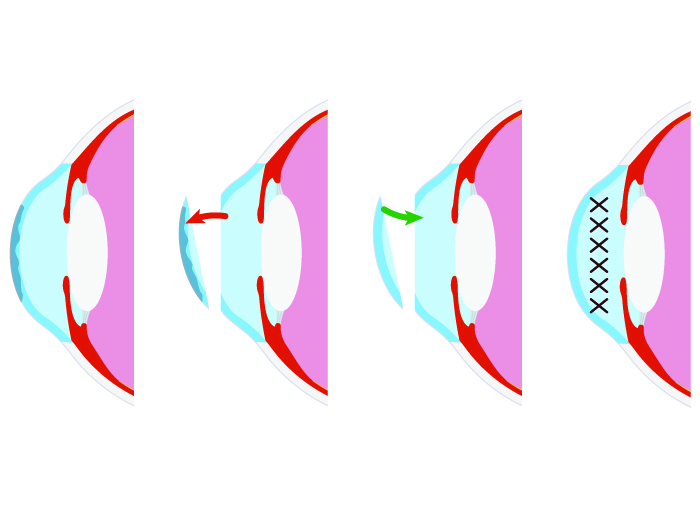Keratoplasty Treatment & Diagnostics in Karol Bagh, Delhi
Keratoplasty
In the field of ophthalmology, keratoplasty is defined as a procedure to put in a donor cornea in the place of your malfunctioning cornea. The cornea is defined as the transparent layer or the interface of the eye through which light enters the eye, enabling a clear vision.
To know more, contact an ophthalmology doctor near you or visit an ophthalmology hospital in New Delhi.
What is keratoplasty?
Keratoplasty or a cornea transplant is essential for patients who have had dim vision or loss of vision because of damaged and diseased corneas. In such situations, the transplant can help in restoring the original vision and even improving it in some cases. It is regarded as one of the safest procedures and has a very small set of risks and complications, like incompatibility with the donor’s cornea

Why is the procedure conducted?
In most situations, wherein a person’s vision has been lost completely, corneal transplant is done, and in some cases, it can also help in relieving pain. The basic problems that can be successfully treated with a transplant of the cornea are:
- Outward bulging
- Thinning cornea
- Tearing cornea
- Scarred cornea
- Swelling of the cornea
- Ulceration of the cornea
- Eye surgery complications
What are some general risks?
Corneal transplants are considered a very safe procedure, but they too have their own set of risks such as:
- Infection of the eye
- Glaucoma - increased pressure on the eyeball
- Stitch failure during keratoplasty
- Cornea rejection
- Excessive bleeding
- Retinal detachment
- Retinal swelling
What are the common signs of rejection of donor cornea?
The body sometimes does not recognize the cornea that has been transplanted, and this is called the process of cornea rejection. It requires a patient to be put on immunosuppressants or the patient may need another cornea transplant. If you suffer from any of the signs or symptoms that are listed below, post keratoplasty, you must contact your healthcare provider immediately. There can be multiple signs such as:
- Complete loss of vision
- Pain in the eye
- Reddening of the eyes&
- Increased sensitivity to light and bright objects
Rejection is a fairly rare phenomenon that happens in about 10% of the cornea transplants. It is a matter of urgent concern and should be dealt with by your healthcare provider at the earliest.
Request an appointment at Apollo Spectra Hospitals, Karol Bagh, New Delhi.
Call 1860 500 2244 to book an appointment.
What are the results of a cornea transplant surgery?
Keratoplasty usually ensures restoration of vision. However, one should keep in mind that symptoms of cornea rejection can occur even after many years post the cornea transplant. It is vital to pay an annual visit to your ophthalmologist.
Conclusion
Keratoplasty, which is also called a corneal transplant, is a fairly simple and risk-free procedure that is done in patients to restore their vision that is lost by damage/ injury/ swelling of the cornea. It can take around several weeks and months to show results and requires the patient to remain in contact with his or her healthcare provider for regular eye check-ups.
There are multiple problems like refractive errors, nearsightedness, and even farsightedness, and they are usually corrected with prescription glasses and sometimes even contact lenses and in extreme cases, with laser surgery.
Astigmatism may occur when the stitchesstitches that hold the cornea in place become looseloose and dip and then the cornea may be displaced from its originaloriginal position. whichT causes blurry spots and dimmed vision. This issue is usually corrected by making the corneal stretchesstretches tight.
The usual medications that are prescribedprescribed after a keratoplasty are eye drops and oral medications to control the risk of infection and pain. They also act as immunosuppressants in order to lowe the chances of rejection of the donor cornea.
Our Top Specialities
NOTICE BOARD
CONTACT US
CONTACT US
 Book Appointment
Book Appointment


.svg)
.svg)
.svg)
.svg)








